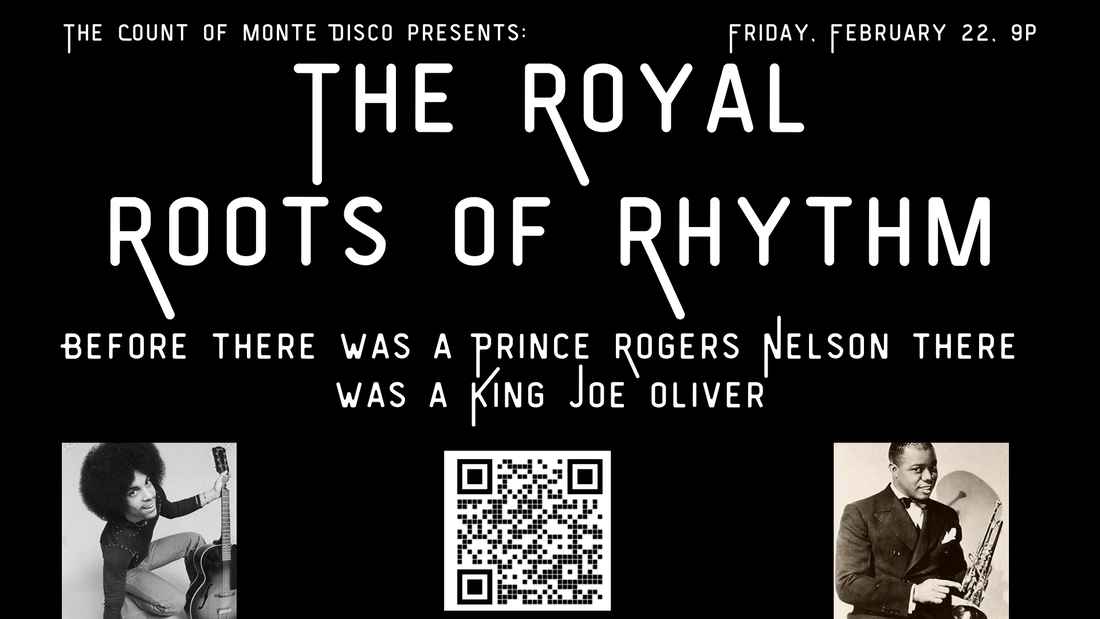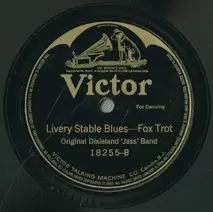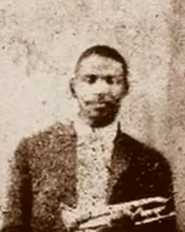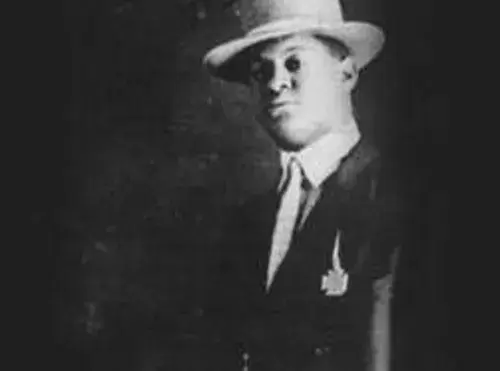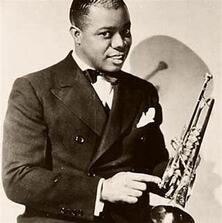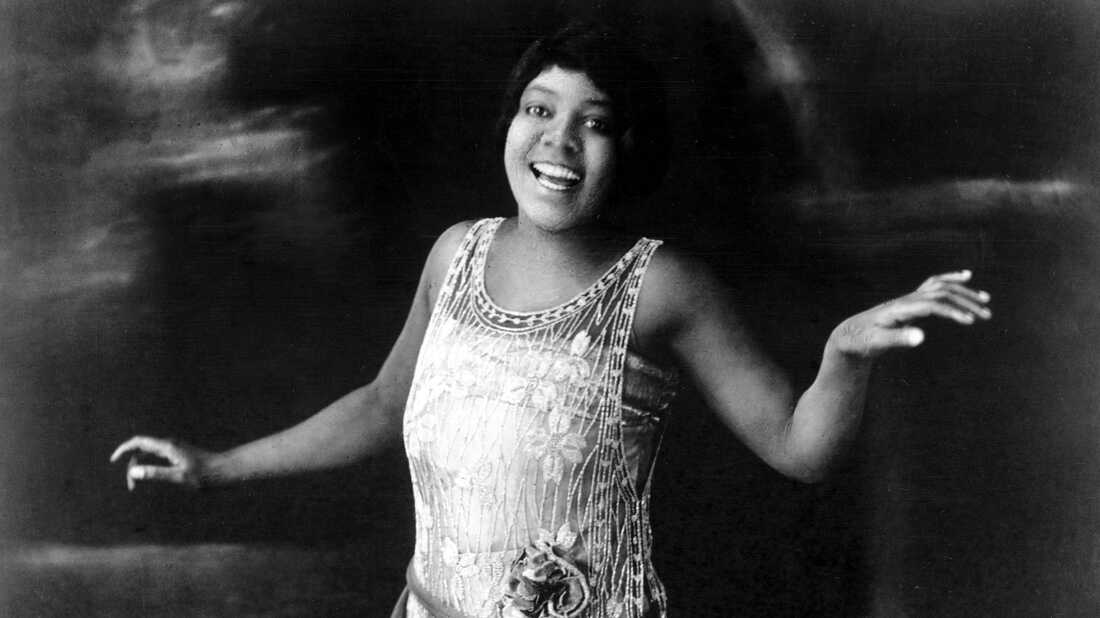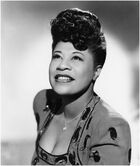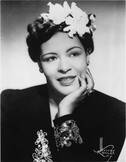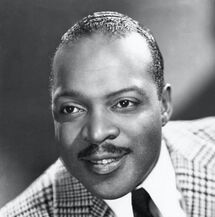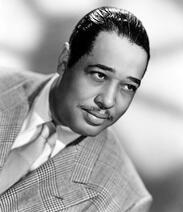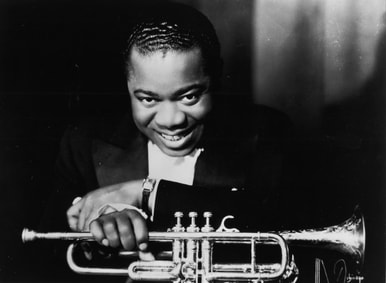The Royal Roots of Rhythm
before there was a prince rogers nelson there was a king joe oliver
From rags to royals
|
|
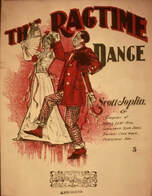 Scott Joplin is the most famous of the "ragtime" composers. Note how important "dance" is to this promotional material. Scott Joplin is the most famous of the "ragtime" composers. Note how important "dance" is to this promotional material.
In the last decade of the nineteenth century, the most important paradigm shift in the history of American music was given the name "ragtime." The "ragged rhythm" originated from the dance music of the first generation of African-Americans raised in a post-slavery United States, and marks the beginning of the significant influence of Black citizens on popular entertainment. Prioritizing improvisation and syncopation, "ragtime" re-worked the popular dance tunes - for instance, the beloved march (think John Phillip Souza) that was perfect for the two-step (not that two-step) and created a synthesis of the African-American understanding of dance rhythms and the European musical form. By the first decade of the twentieth century, the early "ragged" rhythms had matured into distinct musical forms, most notably in a nascent New Orleans variation known as jass.
|
But before we begin...a quick note |
This set showcases the African-American musicians and singers who were so revered for their talents and accomplishments that they were deemend royalty. So, while the aptly named Paul Whiteman was considered to be "The King of Jazz" and the brilliant Benny Goodman earned the position of "The King of Swing", neither of them will be discussed (though Goodman will make an appearance). Further, other seminal Black jazz & swing musicians, like Sidney Bechet or Fletcher Henderson, are not featured, though solely because they lack the noble nickname. Also, this playlist is aristocratic not democratic, so "The Prez" Lester Young will also be skipped (though, like Goodman, he is too good to exclude entirely). Finally, this playlist celebrates high culture, so for those reasons, "Jelly Roll" Morton will also not be discussed. Though, as the self-styled inventor of 'jass', his tribute is the perfect way to introduce the first legendary King.
|
the three kings of jazz
Buddy Bolden (CORNEt): The First king of 'jass'
This song is a "cover" of a Buddy Bolden tune called, "Funky Butt." The song was considered scandalous in the first decade of the 1900s. According to Sidney Bechet, "The police put you in jail if they heard you singing that song...Bolden started his theme song, people started singing, policemen began whipping heads."
It is fitting for a legendary folk genre that its first King is perfectly mythological. There are no surviving recordings of this early monarch. The first mention of his music in print is two years after his death and 25 years after he is institutionalized for schizophrenia. In over 40 documents related to his time in various medical facilities, there are zero mentions of his occupation as a musician. Yet, the history of Jazz cannot begin without him.
If there was one word to describe the music of Charles "Buddy" Bolden, it would be "loud." If allowed, two: "loud" and "rough." His band was once described as "ratty," with their "pants half falling down." Yet, from 1900-1907, Bolden was the unrivaled King of Jazz.
Bolden's blending of ragtime and the tonalities of the region's nascent "blues" music and his preference for improvisation have come to define the New Orleans "hot jazz" sound and usher in "The Swing Era" that he would not live to hear.
If there was one word to describe the music of Charles "Buddy" Bolden, it would be "loud." If allowed, two: "loud" and "rough." His band was once described as "ratty," with their "pants half falling down." Yet, from 1900-1907, Bolden was the unrivaled King of Jazz.
Bolden's blending of ragtime and the tonalities of the region's nascent "blues" music and his preference for improvisation have come to define the New Orleans "hot jazz" sound and usher in "The Swing Era" that he would not live to hear.
Freddie Keppard (cornet/trumpet): The King of Early Jazz
Several notable figures have attested to Keppard's playing style being the most similar to Bolden's in the history of jazz recordings. Keppard's style is seen as a more polished version of Bolden's, with a rhythm that is closer to ragtime than later forms of jazz from New Orleans.
Of the second "King of Jazz", Jelly Roll Morton said "had the best ear, the best tone, and the most marvelous execution I ever heard." Freddie Keppard's reign as "King" began shortly after Bolden passed. The second "King of Jazz" was crowned not only because of his technical prowess (he was described as a "musician's musician" and "everybody's all-star") but also for how similar his playing style was to his predecessor. The few recordings of Keppard's that exist are said to be the closest to the unrecorded Bolden sound.
A contemporary clarinetist admired how he "could play as soft and as loud, as sweet and as rough, as you would want." The Original Dixieland Jazz Band version of "Livery Stable Blues" that is considered to be the first jazz recording is his rendition. He was among the earliest to take the New Orleans variant of ragtime outside of the region and his band's 1914 concert in Canada is considered to be the first international "jazz" performance. By 1919, he was revered in both his hometown and Chicago.
King Keppard's success in the Windy City encouraged other New Orleans musicians to migrate north, spreading the 'jass' rhythm throughout the mid-west. In the early 1920s, Keppard would have his title taken by a young upstart who followed his path to Chicago. Keppard lived another 10 years as a deposed monarch, but like his predecessor, the effects of the early jazz life took its toll and his playing declined severely.
While Keppard is often left out of the royal roll call, his undeniable skill and pioneering spirit turned 'jass' into jazz and a local rhythm into a national sound.
A contemporary clarinetist admired how he "could play as soft and as loud, as sweet and as rough, as you would want." The Original Dixieland Jazz Band version of "Livery Stable Blues" that is considered to be the first jazz recording is his rendition. He was among the earliest to take the New Orleans variant of ragtime outside of the region and his band's 1914 concert in Canada is considered to be the first international "jazz" performance. By 1919, he was revered in both his hometown and Chicago.
King Keppard's success in the Windy City encouraged other New Orleans musicians to migrate north, spreading the 'jass' rhythm throughout the mid-west. In the early 1920s, Keppard would have his title taken by a young upstart who followed his path to Chicago. Keppard lived another 10 years as a deposed monarch, but like his predecessor, the effects of the early jazz life took its toll and his playing declined severely.
While Keppard is often left out of the royal roll call, his undeniable skill and pioneering spirit turned 'jass' into jazz and a local rhythm into a national sound.
joe oliver (CORNET/trumpet): THE definitive KING OF JAZZ
According to historian Ted Gioia, Oliver "was neither the most melodically inventive nor the most technically skilled of the New Orleans cornetists. Yet he remains, in many ways, the measuring rod by which we can gauge the work of other New Orleans brass players."
Joe Nathan Oliver, known at his peak as "King Oliver," provided the bridge between the improvisational, rough, and ragged sound of 'jass" and the swingin' sophisticaton of jazz to come. His great technical contribution to this maturing sound was the prominent usage of mutes - in fact, the onomatopoeia "wah wah" to describe a muted horn sound is taken from his song with the Dixie Syncopators titled, "Wa Wa Wa." In contrast to Bolden and Keppard - both master improvisers - Oliver was also a talented composer, with many of his songs still in circulation at "trad jazz" festivals today.
Oliver also represents the spread of this New Orleans variant of ragtime, moving to Chicago in the late 1910s as part of an early wave of the Great Migration. And though he revered for his talent in New Orleans, Oliver found his kingdom in Chicago, a major destination for African-Americans escaping the strictures of the South. His crown he took from Freddie Keppard, quickly becoming more popular than the king who had encouraged him to move north.
Tragically, Oliver's fate is similar to that of Bolden and Keppard - a difficult descent into pain and poverty. In 1927, Keppard would be offered the opportunity to play as the house band for the famed Savoy Ballroom and the popular Cotton Club cabaret. He would decline both due to issues with money - the contract to for the Cotton Club would be offered to a young, up-and-coming African-American jazz pianist, composer, and band leader named Edward "Duke" Ellington. By the time of his death in 1938, impoverished from the Great Depression and his inability to play due to gum disease, his kingdoms of New Orleans and Chicago had succumb to New York as the definitive home of jazz - with a popular local variant known as "Swing" taking precedence.
King Oliver is the last of the monarchial line established by Buddy Bolden and Freddie Keppard. The title "King of Jazz" was appropriated in the 1920s for Paul Whiteman, a bandleader credited with bringing syncopated rhythms to a greater white mainstream audience (often using arrangements from Black musicians like Fletcher Henderson and occasionally employing dancers like "Shorty" George Snowden).
However, King Oliver's influence on jazz is undeniable, even if just for the way in which his protege transformed the known musical world. So why don't we listen to his protege when he says: "If it had not been for Joe Oliver, jazz would not be what it is today."
Oliver also represents the spread of this New Orleans variant of ragtime, moving to Chicago in the late 1910s as part of an early wave of the Great Migration. And though he revered for his talent in New Orleans, Oliver found his kingdom in Chicago, a major destination for African-Americans escaping the strictures of the South. His crown he took from Freddie Keppard, quickly becoming more popular than the king who had encouraged him to move north.
Tragically, Oliver's fate is similar to that of Bolden and Keppard - a difficult descent into pain and poverty. In 1927, Keppard would be offered the opportunity to play as the house band for the famed Savoy Ballroom and the popular Cotton Club cabaret. He would decline both due to issues with money - the contract to for the Cotton Club would be offered to a young, up-and-coming African-American jazz pianist, composer, and band leader named Edward "Duke" Ellington. By the time of his death in 1938, impoverished from the Great Depression and his inability to play due to gum disease, his kingdoms of New Orleans and Chicago had succumb to New York as the definitive home of jazz - with a popular local variant known as "Swing" taking precedence.
King Oliver is the last of the monarchial line established by Buddy Bolden and Freddie Keppard. The title "King of Jazz" was appropriated in the 1920s for Paul Whiteman, a bandleader credited with bringing syncopated rhythms to a greater white mainstream audience (often using arrangements from Black musicians like Fletcher Henderson and occasionally employing dancers like "Shorty" George Snowden).
However, King Oliver's influence on jazz is undeniable, even if just for the way in which his protege transformed the known musical world. So why don't we listen to his protege when he says: "If it had not been for Joe Oliver, jazz would not be what it is today."
The nobler sex
Bessie Smith (vocals): The Empress of the Blues
The songs that Bessie Smith chose often had themes that were deemed "low-class" by some who were deemed higher society. She once lost out on a record contract with a prominent Black-owned record label because she spit during one of her sessions.
Imagine a singer…a Black singer….a Black female singer…a Black female queer singer…in the 1920s. Imagine her performing with dozens of backing dancers and musicians. Imagine her traveling the country in her personal 72-foot railroad car. Imagine her talent as so undeniable that her original marketing moniker as “The Queen of the Blues” was deemed too lowly a position.
We’ve just imaged Bessie Smith…The Empress of the Blues.
Born in Tennessee to a musical family and considered the protege to Ma Rainey, the original “Mother of the Blues”, Smith would achieve a status that few Black musicians, male or female, were able to sustain in the early Jazz Age. Her success was due to a combination of vocal talent that had the perfect tone and power for the budding recording age and a stage presence that was likened to that of a preacher with her ability to move an audience.
Through the later Jazz Age, Bessie Smith became the top headlining attraction on the African-American showtime circuit known as the Theater Owner’s Booking Association.
Like many of rhythm’s royalty, The Empress’s decline was difficult. As vaudeville lost the entertainment battle to moving pictures, Smith had difficulty maintaining her lifestyle. A late 1920s Broadway show flopped, though her performance was praised. Sadly, Smith’s attempts at transitioning from blues to Swing in the 1930s was cut short when she was killed in a 1937 car accident.
We’ve just imaged Bessie Smith…The Empress of the Blues.
Born in Tennessee to a musical family and considered the protege to Ma Rainey, the original “Mother of the Blues”, Smith would achieve a status that few Black musicians, male or female, were able to sustain in the early Jazz Age. Her success was due to a combination of vocal talent that had the perfect tone and power for the budding recording age and a stage presence that was likened to that of a preacher with her ability to move an audience.
Through the later Jazz Age, Bessie Smith became the top headlining attraction on the African-American showtime circuit known as the Theater Owner’s Booking Association.
Like many of rhythm’s royalty, The Empress’s decline was difficult. As vaudeville lost the entertainment battle to moving pictures, Smith had difficulty maintaining her lifestyle. A late 1920s Broadway show flopped, though her performance was praised. Sadly, Smith’s attempts at transitioning from blues to Swing in the 1930s was cut short when she was killed in a 1937 car accident.
Ella Fitzgerald (vocals): The queen of Jazz
When the “First Lady of Jazz” won the Amateur Night contest at Harlem’s Apollo Theater on November 21, 1934, she was not offered the week-long gig that was listed as the prize due to her appearance. She was 17. When “Lady Ella” auditioned to sing for the Chick Webb Orchestra, the diminutive drummer did not want to hire her because she was “gawky and unkempt.” She was 18.
Yet, by the time of her last performance in 1993 - Ella Fitzgerald was the unquestioned “Queen of Jazz.” She was 76. In the 59 years of her professional life, Ella became the preeminent American vocalist - establishing jazz and swing as American music that was something all together different than the regional variants of turn of the century ragtime.
Over the course of her life, Ella went from shy singer to band leader to world celebrity. She won 14 Grammy Awards, a National Medal of the Arts, the Presidential Medal of Freedom and the NAACP’s first-ever President’s Award.
Yet, by the time of her last performance in 1993 - Ella Fitzgerald was the unquestioned “Queen of Jazz.” She was 76. In the 59 years of her professional life, Ella became the preeminent American vocalist - establishing jazz and swing as American music that was something all together different than the regional variants of turn of the century ragtime.
Over the course of her life, Ella went from shy singer to band leader to world celebrity. She won 14 Grammy Awards, a National Medal of the Arts, the Presidential Medal of Freedom and the NAACP’s first-ever President’s Award.
Billie holiday (vocals): "Lady day"
“Lady Day” was born Eleanora Fagan to an unwed, teenage couple in 1915. This ignoble start stands in stark relief to the heights the professionally named Billie Holiday would reach. Moving to Harlem at 14, Holiday started working almost immediately as a cabaret singer. The famed “King of Swing” Benny Goodman heard her in 1931, when she was just 16 and two years later, hired her to sing for his band.
According to jazz producer John Hammond, Holiday’s “singing almost changed my music tastes and my musical life” and called her “an improvising jazz genius.”
Over the course of her career, Billie Holiday would go on to sing with Teddy Wilson, Count Basie, Artie Shaw, and “The Prez” Lester Young - who christened her “Lady Day.”
Known for her uniquely emotive voice, Holiday had success with both uptempo dance tunes and slower, heartfelt ballads. In 1939, Holiday produced her most important work, “Strange Fruit” - a poem and song written by a jewish schoolteacher in NY after reading about a Southern lynching.
Despite the challenges she faced, including a racially-motivated, targeted campaign by multiple federal agencies, Holiday continued to perform sold-out concerts up to her early death at 44.
According to jazz producer John Hammond, Holiday’s “singing almost changed my music tastes and my musical life” and called her “an improvising jazz genius.”
Over the course of her career, Billie Holiday would go on to sing with Teddy Wilson, Count Basie, Artie Shaw, and “The Prez” Lester Young - who christened her “Lady Day.”
Known for her uniquely emotive voice, Holiday had success with both uptempo dance tunes and slower, heartfelt ballads. In 1939, Holiday produced her most important work, “Strange Fruit” - a poem and song written by a jewish schoolteacher in NY after reading about a Southern lynching.
Despite the challenges she faced, including a racially-motivated, targeted campaign by multiple federal agencies, Holiday continued to perform sold-out concerts up to her early death at 44.
the african-american aristocracy
William Basie (Piano): "Count"
What is the importance of a noble name? For instance, William has denoted a King at least 14 times in European history. However, according to the same source, there has never been a King Bill. Bill's can be actors, comics, stand up comedians, solo musicians, and even politicans...but not Kings...or bandleaders. Though born in New Jersey and seasoned in the burgeoning jazz scene of 1920s New York, Bill Basie and his orchestra had begun to make a name for themselves in Kansas City. Bill Basie had relocated to Missouri in the late 1920s to play with famed musician Benny Moten...and eventually took over the band when Moten was voted out. In 1936 Bill Basie and his band secured a residency at the Reno Club.
edward ellington (Piano): "Duke"
the one to rule them all
He was born and orphan and died 'Pops' to an entire world. His playing influenced every generation to follow. Claimed to be born on the fourth of July and dying on that same date, Louis Armstrong is the embodiment, the example, the everything of twentieth-century American music.
To paraphrase Frank Ocean:
What's a man to a king. What's a king to a god. What's a god to Louis Armstrong.
To paraphrase Frank Ocean:
What's a man to a king. What's a king to a god. What's a god to Louis Armstrong.

